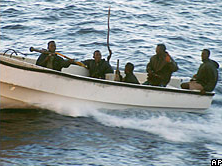 No sooner did I blog about the growing security threat posed by maritime piracy than several powerful militaries took notice… not because I was particularly persuasive, but because a Ukranian freighter loaded down with $30 million worth of tanks, grenade launchers and other military equipment was captured by marauders off the coast of Somalia.
No sooner did I blog about the growing security threat posed by maritime piracy than several powerful militaries took notice… not because I was particularly persuasive, but because a Ukranian freighter loaded down with $30 million worth of tanks, grenade launchers and other military equipment was captured by marauders off the coast of Somalia.
Two dozen crew members are still hostage aboard the MV Faina, now anchored off the Somali coast, while the pirates repeatedly isuse a series of ransom demands – though it’s not obvious to me to whom. (Also, their demands have fallen, like the global stock market, since Sunday: down to $20 mil from an original demand of $35 mil.) Both the US and Russia have sent vessels to intercept the MV Faina – Russia because many of her crew members are Russian; the US because of intel that the arms shipment may have been heading not to Kenya, as claimed by both Nairobi and Kiev, but rather to Khartoum. (The plot thickens.) Neither country wants the pirates to sell the weapons to Islamist warlords in Somalia, although it is quite unclear whether they would even be in any position to offload such heavy machinery.
In an mildly entertaining twist on the story, a spokesperson for the pirate crew was interviewed today by the NY Times.
The Somali pirates who hijacked a Ukrainian freighter loaded with tanks, artillery, grenade launchers and ammunition said in an interview on Tuesday that they had no idea the ship was carrying arms when they seized it on the high seas. “We just saw a big ship,” the pirates’ spokesman, Sugule Ali, said in a telephone interview. “So we stopped it.” In a 45-minute interview, Mr. Sugule spoke on everything from what the pirates wanted (“just money”) to why they were doing this (“to stop illegal fishing and dumping in our waters”) to what they had to eat on board (rice, meat, bread, spaghetti, “you know, normal human-being food”).
(Interesting how he feels the need to stress his shipmates’ human-being-ness, as if he wants us fend off misconceptions that he and his brethren are actually akin to those under the curse of the Black Pearl.)
He said that so far, in the eyes of the world, the pirates had been misunderstood. “We don’t consider ourselves sea bandits,” he said. “We consider sea bandits those who illegally fish in our seas and dump waste in our seas and carry weapons in our seas. We are simply patrolling our seas. Think of us like a coast guard.”
Though Adam Blickstein reminds us we can hardly take his rhetoric at face value, it does show him to be a skilled and savvy diplomat more than a common criminal. He manages to make a principled claim justifying his behavior on nationalist grounds, while claiming to side-step any political motives that would link him or his crew to US or Russian security interests in the region. Not that the superpowers are buying it for a moment – though neither are they storming the ship. Yet.
Meanwhile, pirate afficionados can take a certain guilty pleasure in admiring the swashbuckling bravado of the envoy, who, poking fun at Western humanitarian norms, told the reporter obligingly:
““Killing is not in our plans… We only want money so we can protect ourselves from hunger.” When asked why the pirates needed $20 million to protect themselves from hunger, Mr. Sugule laughed and said, “Because we have a lot of men.”
Right.
Charli Carpenter is a Professor in the Department of Political Science at the University of Massachusetts-Amherst. She is the author of 'Innocent Women and Children': Gender, Norms and the Protection of Civilians (Ashgate, 2006), Forgetting Children Born of War: Setting the Human Rights
Agenda in Bosnia and Beyond (Columbia, 2010), and ‘Lost’ Causes: Agenda-Setting in Global Issue Networks and the Shaping of Human Security (Cornell, 2014). Her main research interests include national security ethics, the protection of civilians, the laws of war, global agenda-setting, gender and political violence, humanitarian affairs, the role of information technology in human security, and the gap between intentions and outcomes among advocates of human security.

0 Comments